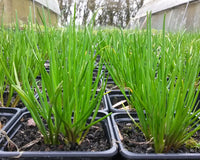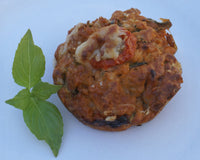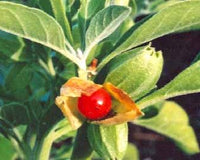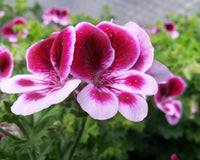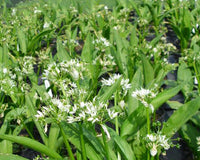As we move through September, with Zero Waste Week taking place in the first full week of the month, there's never been a better time to master the art of herb preservation. If you've been nurturing a thriving herb garden all season, learning to preserve your herbs not only extends their life but also helps reduce food waste while ensuring you have flavourful herbs throughout the winter months.
When to Harvest Your Herbs
Most herbs are at peak flavour when flower buds first appear, before they are fully open, making late summer and early autumn the perfect time for preservation.
Drying herbs
Drying herbs concentrates flavours by removing moisture while creating ingredients that will keep for months. It's perfect for creating your own tea blends from mints, meadowsweet, or chamomile, making seasoning mixes from sage and thyme, and adding robust flavour to hearty winter stews, casseroles and roasts when fresh herbs aren't available.
How to Dry Your Herbs

For most herbs, gather them into small bundles and tie with a rubber band (which will tighten as the stems shrink during drying). Hang these bundles in a cool, well-ventilated space away from direct sunlight and moisture sources like the sink, stove or dishwasher.
Herbs used for tea, like mints and lemon balm, are best cut whilst still green (and maybe flowering) before hanging to dry. Others, such as lavender, can be spread out onto newspaper out of direct sunlight rather than hung in bundles.
Storage and Use
Once completely dry, the leaves can then be crumbled from the stems and stored in airtight jars or containers. For tea herbs, simply use about one teaspoon of dried herbs per cup of boiling water and steep for 5-10 minutes.

Dried herbs keep their flavour and colour 3 months in cupboards and up to 1 year in refrigerators or freezers. Remember that dried herbs are three to four times stronger than fresh, so use about ⅓ or ¼ of the quantity specified for the fresh equivalent in recipes.
Freezing herbs
Freezing maintains much of the original colour and fresh flavour of herbs, making it ideal for delicate varieties that lose their character when dried. It's particularly useful for preserving basil, coriander, parsley and dill for use in cooked dishes throughout winter.
How to Freeze Your Herbs
Big leafy annuals, such as dill, basil and coriander, which may also be flowering, can be pulsed in a food processor (flowers as well) with a little water (or oil) and made into a thickish purée. This can then be dolloped into ice cube trays and frozen, then tipped out into bags or containers for easy storage.


If you have big leafy basils, pick the basil leaves and place them in a bowl. Drizzle a small amount of rapeseed oil over the leaves and use your hands to gently coat them. Place the coated leaves in a resealable bag. Seal most of the bag, leaving a small gap. Gently push out as much air as possible before sealing completely and store in the freezer.
How to Use Frozen Herbs
Your cubes can then be dropped frozen into meals whenever a recipe calls for herbs. Just remember that although frozen herbs impart excellent flavour for cooking, they're not suitable for garnishes as they do become limp and dark in colour.
For the basil leaves, break off the desired amount to use for cooking. The leaves defrost and disintegrate very quickly, so return the rest to the freezer immediately.
Herb Infused Oils
Creating herb-infused oils captures the essence of your herbs in a versatile cooking ingredient. These oils add instant flavour to dishes and make wonderful gifts.

Making Herb Oils
Simply infuse your favourite herbs while still green in high-quality olive oil - sage and oregano both work well for drizzling over salads, pastas, or roasted vegetables. Place fresh, clean herbs into small glass containers, pour over warm (but not hot) oil, and then allow them to infuse for about three weeks. The herbs can be left in the jar, or the oil can be strained for a cleaner appearance.

How to Use Herb Oils
These herb-infused oils are perfect for drizzling over salads, pastas, or roasted vegetables. A homegrown herb infused oil makes a wonderful gift too. Some medicinal herbs can also be infused in oil to rub onto the skin - good examples are calendula and St Johns wort (pictured).
For food safety, always store herb-infused oils in the refrigerator and use within one month for peak flavour.
Herb Butters
Herb butters offer the perfect solution for preserving delicate herbs while creating an instant flavour enhancer for your cooking. Store them in the fridge or freezer and you'll always have restaurant-quality finishing touches ready for vegetables, meats, or fresh bread.
Making Herb Butter
Parsley, rosemary, coriander, chives, tarragon and chervil are all good candidates for herb butters. Leave the butter at room temperature until it softens. Chop finely the fresh herbs and grate lemon zest if using. Put the softened butter in a bowl. Use a fork, mash it together with the herb and lemon zest until thoroughly combined. If you started with unsalted butter, you can add salt to taste (those on low salt diets may find herb butters are a flavourful way to skip salt altogether).
Scoop the herb butter onto a piece of waxed or parchment paper. Shape it into a log by rolling it in the paper. Wrap the herb butter tightly and refrigerate for up to 2 months. If storing for more than 2 months, put the wax or parchment wrapped butter into a freezer bag and freeze for up to 12 months.
Using Herb Butters
Herb butters are superb on fish and other seafood and on almost any cooked vegetable. Use parsley plus lemon zest on steamed or boiled vegetables. Chive butter is great on baked potatoes. Cut thin rounds of herb butter to serve at each place at dinner parties. Garnish with a fresh sprig of the same herb if available. Melt butter and drizzle over seafood after cooking and just before serving. You can even drizzle melted herb butter over popcorn.
Storage Tips
- Label everything with the herb type and date of preservation
- Use airtight containers - glass jars work particularly well for dried herbs as they prevent odour transfer
- Store in cool, dark places as heat and light degrade both flavour and colour
- Check regularly and remove any herbs showing signs of mould immediately
Good for You, Good for the Planet
Preserving your herbs reduces food waste and gives you quality ingredients throughout the seasons. By making your own dried herbs, teas, and flavoured oils, you're also avoiding unnecessary packaging and reducing your environmental impact. It's a simple way to make the most of what you grow while helping the planet.
Image credits:
Dried herbs (top): Photo by Anne Nygård on Unsplash
Bunches of herbs drying: Photo by Jan Antonin Kolar on Unsplash


